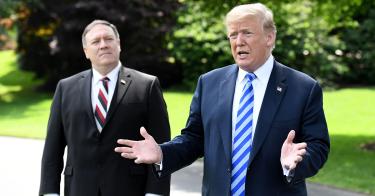During his confirmation hearing in April, now-Secretary of State Mike Pompeo promised to fill unoccupied positions in the U.S. State Department. But as May gives way to June, the Office to Monitor and Combat Trafficking in Persons still lacks an ambassador-at-large as it prepares to release its annual Global Report on Trafficking in Persons — one of the department’s most potent tools.
The position has been vacant for almost a year, and the annual report, which ranks countries according to their compliance with minimum standards for the elimination of human trafficking in four tiers, is a critical diplomatic instrument for the U.S. government.
The report provides considerable leverages: Countries deeply desire to see improvements in their rankings and take them seriously. More than just a tool for naming and shaming, it offers recommendations for how countries can better address human trafficking and provides areas for cooperation in addressing a global scourge that the International Labour Organization and Walk Free Foundation estimate impacts more than 40 million people worldwide. Judith Kelley, the dean of Duke University’s Sanford School of Public Policy, rigorously and quantitatively documented how the report’s grades improved the behavior and laws of governments in her aptly named book, Scorecard Diplomacy, published last year.
The Trafficking in Persons report came under fire in 2015 when perceived politicization of the report lead to premature upgrades in rankings for both Malaysia and Cuba. Reporting by Reuters showed that the U.S. government manipulated the rankings for political purposes (including a desire to see Malaysia included in the Trans-Pacific Partnership), with senior State Department officials overruling official recommendations for rankings in at least 14 different countries. Without an appointed head of the office, there is no one to go head to head with the assistant secretaries at the regional bureaus of the State Department to defend the rankings the office recommends from inconsistencies and political whims, working to make it a reflection of facts on the ground.
After the 2015 report, critics, including a co-author of this piece, questioned the project’s impartiality and called for reforms.
The Trump administration requested that former President Barack Obama’s ambassador, Susan Coppedge, stay on through the release of the 2017 report in order to ensure that the office had a leader at the helm for that occasion. At the time, rumor had it that the Trump administration would ultimately offer the position to Cindy McCain, Republican Sen. John McCain’s spouse and a principled advocate on trafficking at the McCain Institute for International Leadership. While she never received the nomination formally, many suspected that she would end up accepting the position in spite of her husband’s ailing health and rocky relationship with the president.
The administration has considered some other serious candidates since, including John Cotton Richmond, the founding director of the Human Trafficking Institute and a former federal prosecutor at the Department of Justice. Yet, with the imminent release of the 2018 report, there is no political leader of the office, nor an announced intention to nominate a particular successor to Coppedge.
Unless the Trump team names a nominee soon, this year’s report will come with no one at the helm to set policy priorities, and the department will miss an opportunity to make use of the leverage the report provides.
One of the authors of this piece, Mark P. Lagon, as former ambassador-at-large to combat trafficking in persons in the George W. Bush administration from 2007 to 2009, has seen how the office and its leader can make a difference. Even in the last two years of an administration, an ambassador can change the debate, highlighting impunity for trafficking for labor, and win credible rankings — working together with other senior officials. An example: the office’s close work with the then-number two of the Europe and Eurasia bureau, Kurt Volker (currently the head of the McCain Institute and the U.S. special representative for Ukraine negotiations).
Human trafficking is too important to get lost in the policy priority mix. At present, there is also no interagency plan of action to address severe international and domestic human trafficking challenges, and one that was in the works recently got scrapped. Moreover, the attorney general’s report on U.S. efforts to combat human trafficking hasn’t been issued since 2015, something one of us, Lagon, as ambassador successfully pressed to release at the same time as the State Department’s annual global report.
Apart from lacking a capable person in charge, an issue of enduring bipartisan interest is in danger of languishing. Despite passing legislation in March that put pressure on the internet sex trade, Congress last year did not reauthorize the Trafficking Victims Protection Act, the cornerstone legislation that created the State Department office and report. Congress ought to remember what should be its top priority in legislating on trafficking in persons: bolstering the Trafficking Victims Protection Act, the office, and the report as a powerful policy tool.
The administration must move quickly if it wishes to have a meaningful impact on the trafficking debate. It should fill the ambassador-at-large position, as the original trafficking legislation’s author in Congress urged in a letter to Pompeo. The new ambassador could champion what’s needed most: above all, a focus on both labor and sex trafficking — unfortunately, the focus on these issues has rarely occurred in tandem due to ideological constituencies that favor addressing one form of trafficking over the other. Other imperatives needing a confirmed champion are rededication to survivor re-empowerment as the top moral priority, greater transparency of supply chains and criminal networks, and, critically, strengthening of the credibility and leverage of the report. The fight against human trafficking has strong bipartisan support. With an envoy in place and a strong policy agenda, the United States has the real possibility of shrinking and ultimately abolishing this form of modern slavery.
This piece originally appeared on ForiegnPolicy.com



